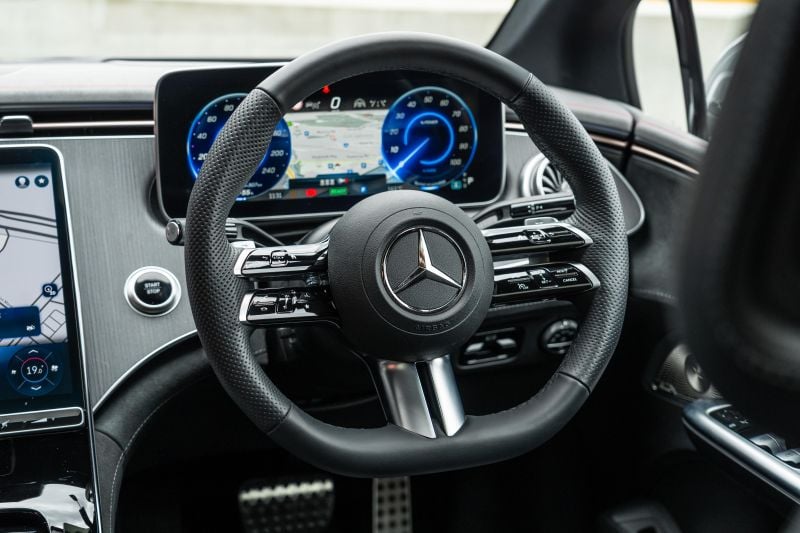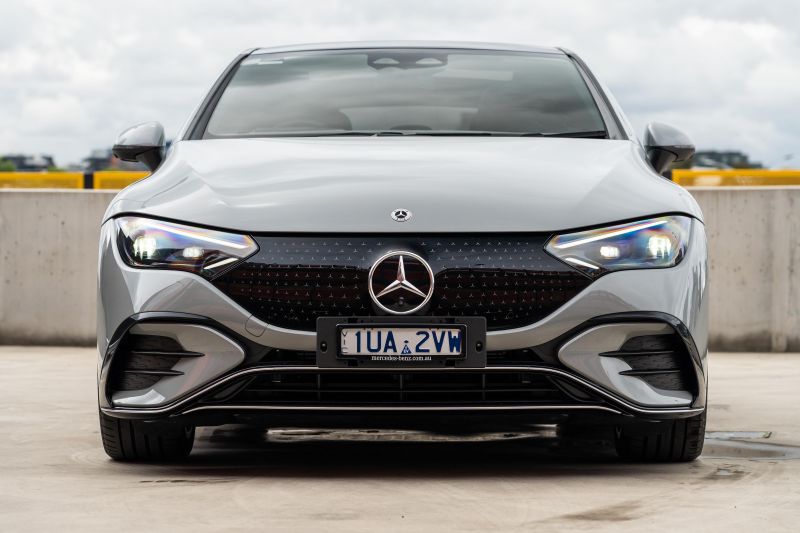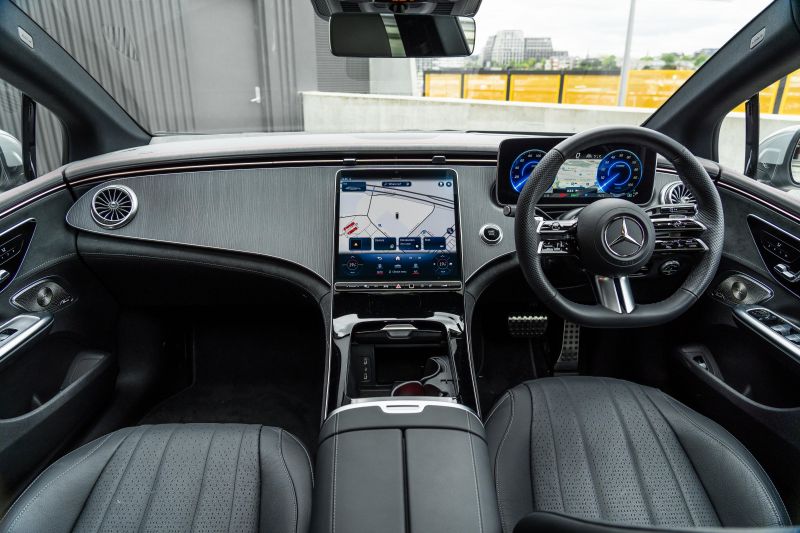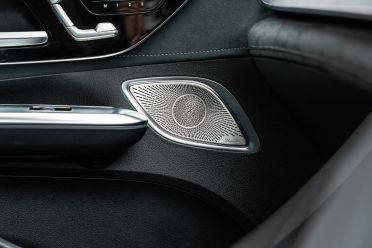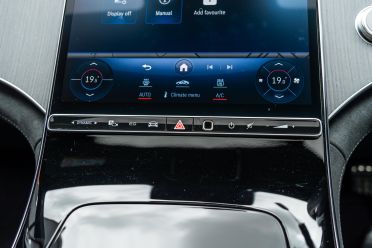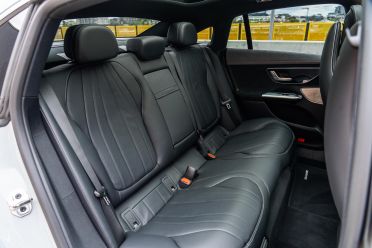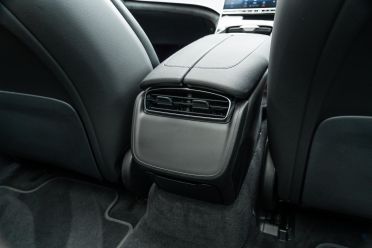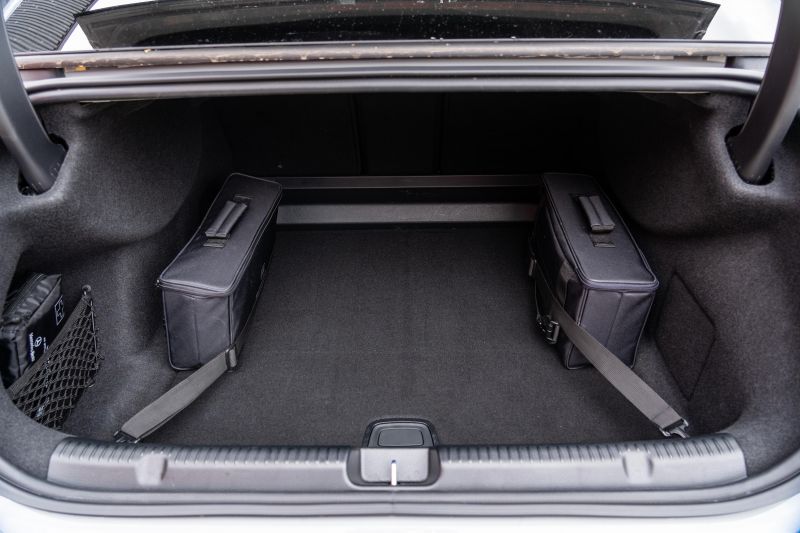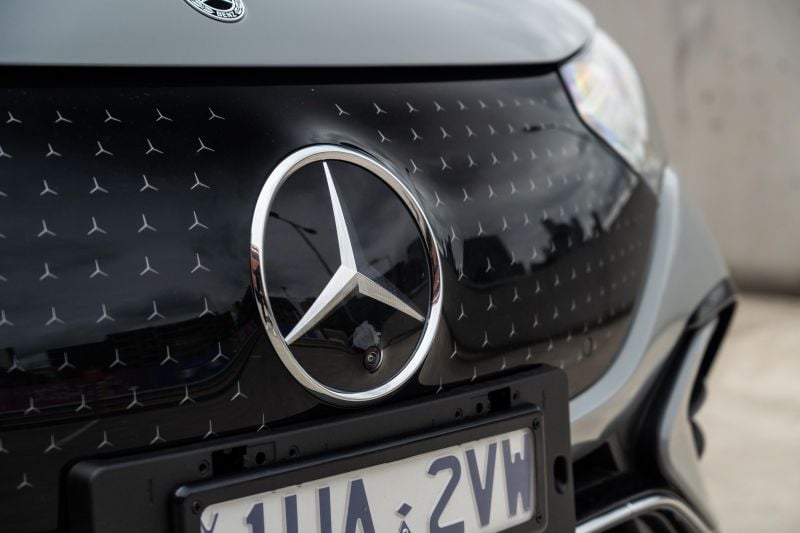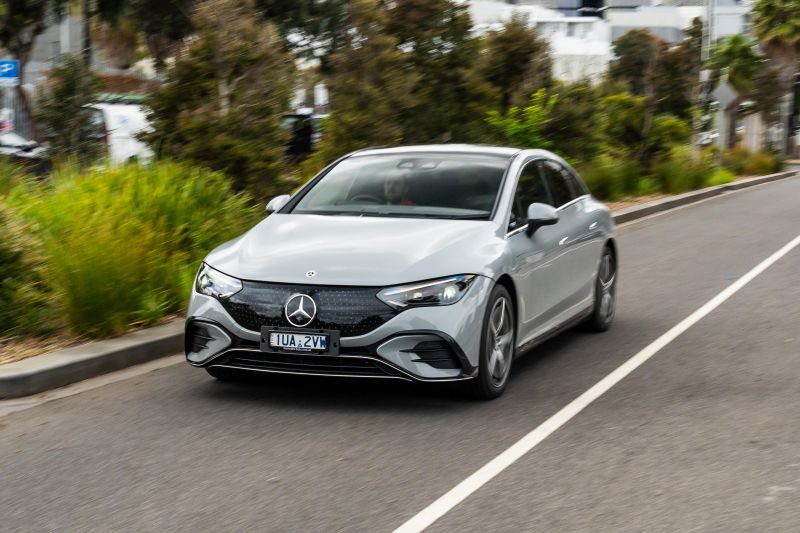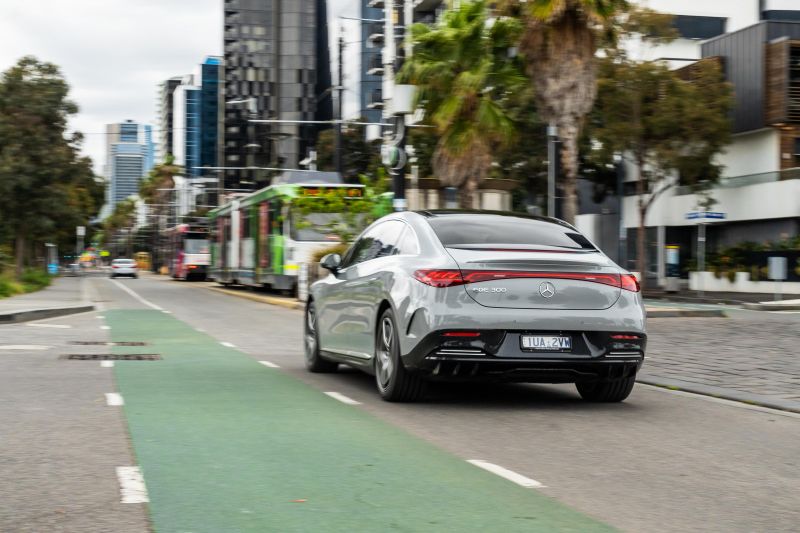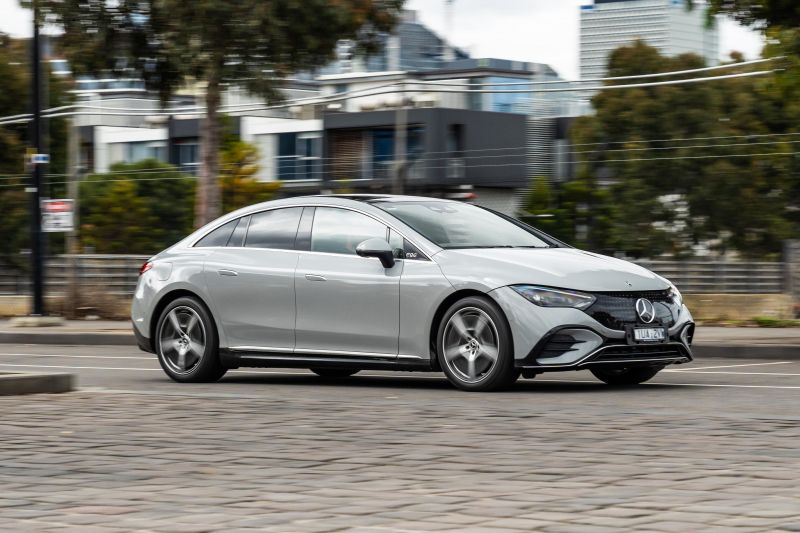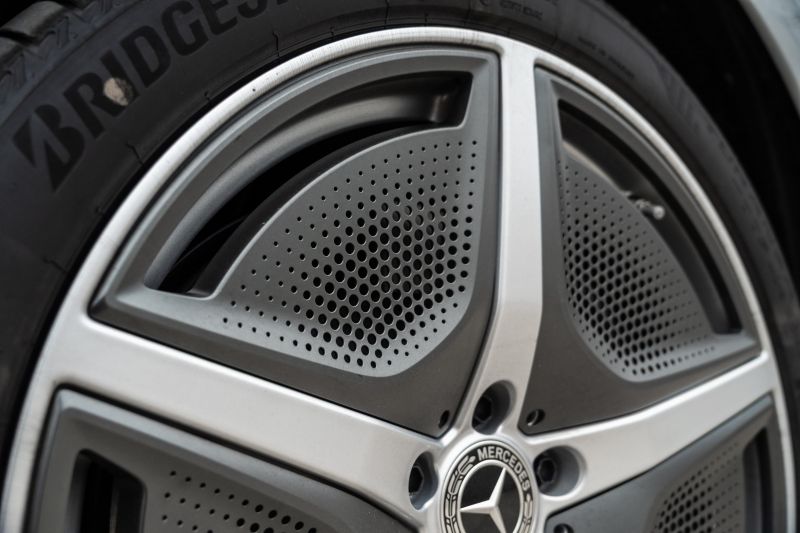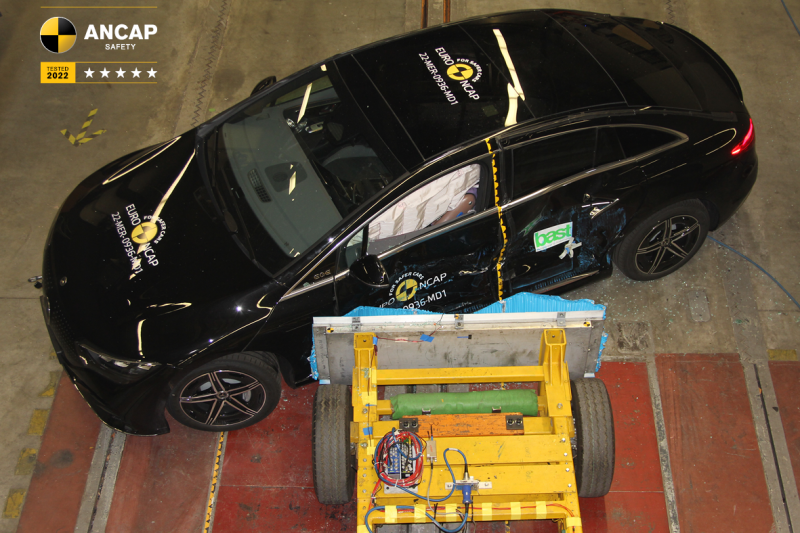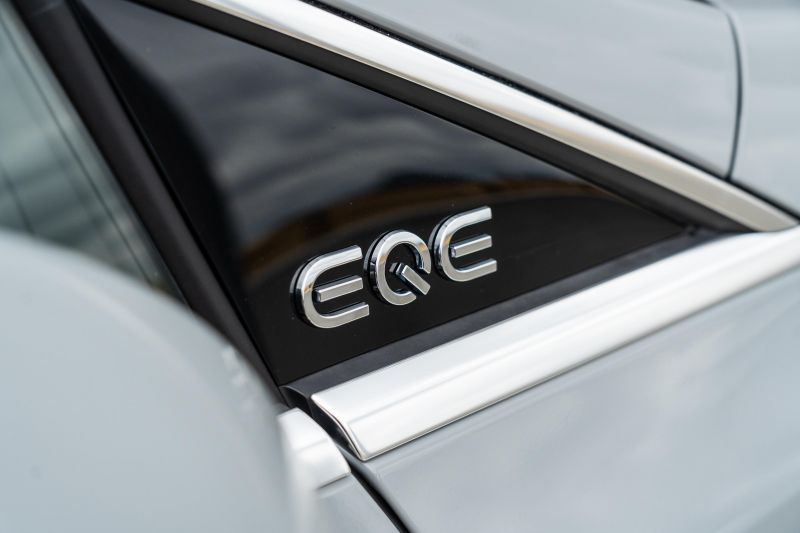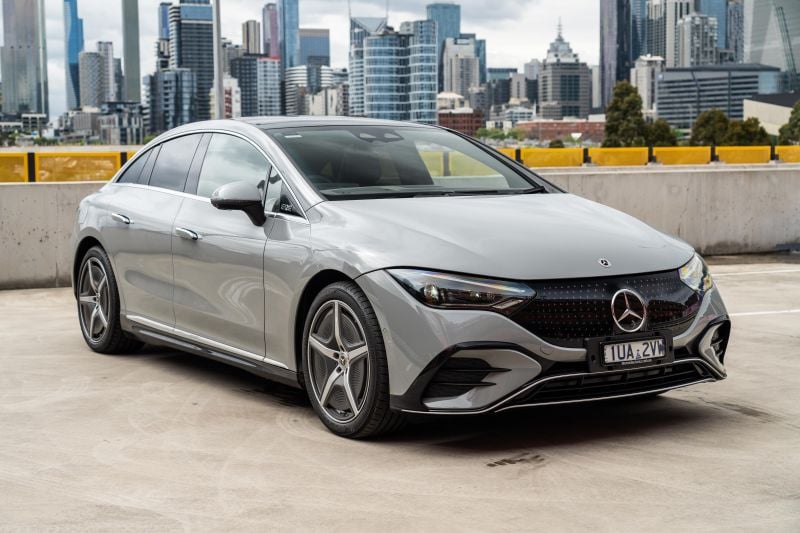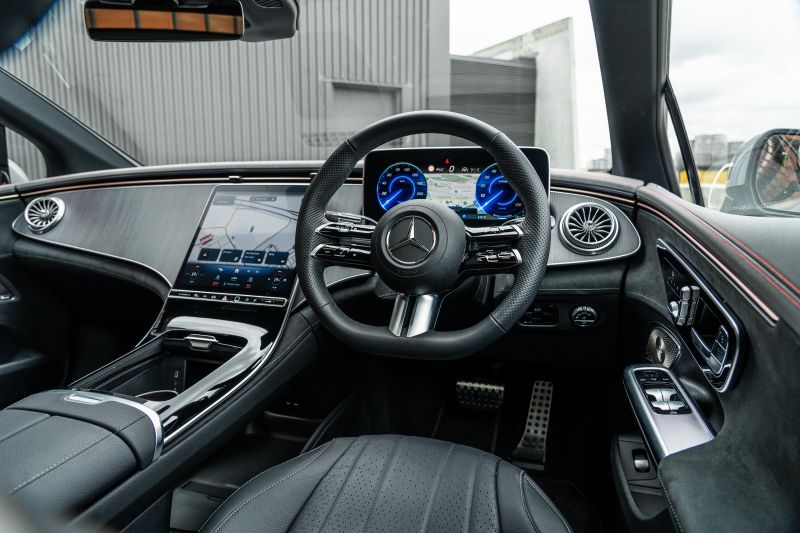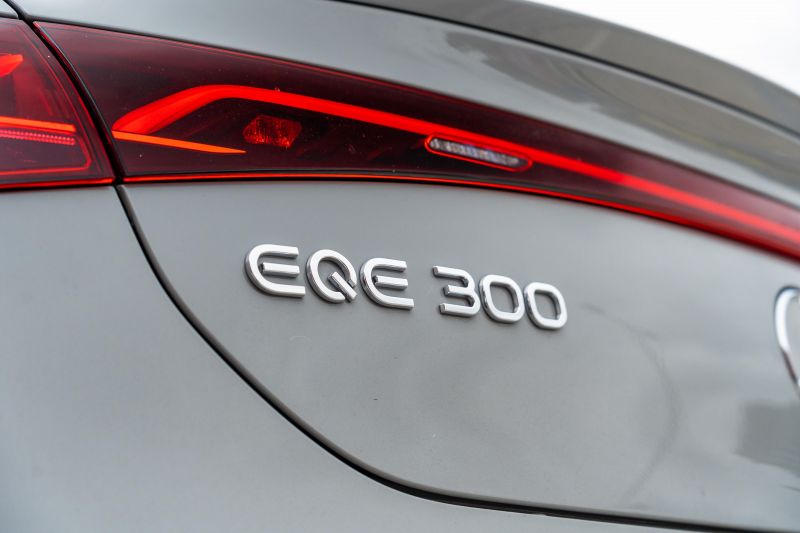The E-Class has long been my favourite Mercedes-Benz sedan design – the EQE not so much.
Mercedes-Benz has long been the go-to brand for luxurious, elegant and desirable saloons, and the current C-Class, E-Class and S-Class still have designs that represent this fairly well.
Since Mercedes-Benz started revealing its EQ-badged electric models, I’ve never taken to the design language that focuses on monobrow light bars and droopy LED signatures. I warmed to the EQC, the EQA still looks a bit odd, and the EQB is inoffensive but still not as clean or handsome as its GLB base car.
Then came the EQ models based on a dedicated electric architectures – EQE and EQS, both available in sedan and SUV bodies. Both look like enlarged variations of the Apple Mouse, particularly when specified in white.
Having recently spent some time in the BMW i5, which is a 5 Series with an electric drivetrain, I was interested to see if having a dedicated EV architecture brought about tangible benefits in the 2024 Mercedes- Benz EQE 300, even if the design wasn’t to my tastes.
This entry-level electric Benz is about $20,000 cheaper than the most affordable i5 in Australia, and in the scheme of things doesn’t leave you wanting for much in terms of standard equipment – though the BMW beats it for performance.
Does this dedicated electric Mercedes live up to its “electric E-Class” pitch?
How much does the Mercedes-Benz EQE 300 cost?
Our entry-level EQE 300 opens the range at $134,900 before on-road costs.
That makes it almost $20,000 more affordable than the next model up, the EQE 350 4MATIC – which adds a dual-motor all-wheel drive electric drivetrain with more power and performance, but not a whole lot else spec-wise.
It’s also quite a bit cheaper than its most natural rival, the BMW i5 eDrive40 ($155,900), and well below the starting price of the most attainable Porsche Taycan ($165,700). You could perhaps throw the Genesis Electrified G80 into the mix as well, priced from $145,675 plus on-road costs but with more power and performance than the EQE.
2024 Mercedes-Benz EQE Sedan pricing:
- Mercedes-Benz EQE 300: $134,900
- Mercedes-Benz EQE 300 4MATIC: $153,575
- Mercedes-AMG EQE 53 4MATIC+: $213,574
Prices exclude on-road costs
What is the Mercedes-Benz EQE 300 like on the inside?
A lot like the new C-Class, which has its advantages and disadvantages…
You get a pair of excellent displays – one ahead of the driver and one for the infotainment system – running the latest Mercedes-Benz has to offer in terms of software and connectivity.
The 12.3-inch digital driver’s displays is beautifully crisp with fluid animations, and heaps of customisability. Mercedes-Benz is one of the few brands that takes the fight to the Volkswagen Group in the digital instruments arena.
It’s positioned behind a fat Nappa leather-trimmed steering wheel which feels lovely to hold and the chunky rim has a nice feeling of solidity when on the move.
What’s not so great are the double-decker touch-capacitive controls, which are even fiddlier than Volkswagen’s. The oddly-shaped volume and directional controls, for example, regularly result in misfires or inaccurate presses.
I’m also not a huge fan of all-black interiors, though the perforated leather presents well. You can option a distinctive Space Grey interior with matching steering wheel.
Look over to the centre of the dashboard and you’re presented with a 12.8-inch OLED touchscreen that’s familiar from the likes of the latest C-Class and S-Class, with even better clarity than the driver’s display.
It sports a special film to combat glare, and is well placed to make operation simple. The MBUX 2.0 interface has streamlined menus and dedicated shortcuts to further aid usability, and it’s so much less convoluted than the first-generation system.
Apple CarPlay and Android Auto are wireless, and there’s standard connected navigation with live traffic updates and an augmented reality (AR) function that uses a live forward camera feed and overlays cool animations and graphics, which sort of look like the stuff you’d see in a video game if you’ve ever played Need for Speed.
The front seats are comfortable and supportive, while also offering heaps of electric adjustment. They’re also heated in this specification. I love an extendable thigh cushion, even better when it’s powered.
Storage is pretty impressive too, with heaps of draws and cubbies to stow your stuff. Of particular note is the shelf under the centre console, which can hide larger items out of sight.
For me it feels too much like a C-Class given the badging and pricing, though it’s dressed up a little with the stitched leatherette detailing on the upper sections of the dashboard and doors.
The piano black trim on the centre console also grates. It attracts finger prints like no tomorrow and our test car was already pretty scratched up from previous loans – not a great sign of long-term durability.
Normally the back seat is the place to be in an E-Class or S-Class, but in the base EQE things are a little austere.
There’s no third zone of climate control, just vents, and the actual space on offer is average rather than outstanding. There’s a relatively flat floor in lieu of a mechanical driveline between the front and rear axles, but the sloping roofline and raised floor don’t make for limousine levels of space.
Leg and knee room are good enough, but you still get a bit of that knees-up feeling and if you’re above average height like me, you’ll be pretty close to that headliner if you sit fairly upright. It’s meaningfully bigger than something like a C-Class, though.
Rounding out the amenities in the rear are ISOFIX and top-tether mounts for child seats, as well as a fold-down centre armrest with cupholders.
Mercedes-Benz quotes 430 litres of boot capacity, though that doesn’t account for the two large carry bags that hold your charging cables. You can fold the rear seats if you need to stow longer items, too.
There’s no spare wheel in the EQE, rather a tyre sealant kit with inflation compressor.
What’s under the bonnet?
Power in the EQE 300 comes from a single electric motor on the rear axle.
Outputs are quoted at 180kW and 550Nm, good for a 0-100km/h time of 7.3 seconds.
It’s fed by an 89kWh battery pack, which is slightly smaller than the 90.5kWh unit used in the EQE 350 4MATIC and AMG EQE 53 4MATIC+.
Mercedes-Benz Australia quotes an energy consumption figure of 16.3kWh per 100km, with maximum range of 626 kilometres – both figures quoted are supplied with the Australian spec sheet and based on the older NEDC test cycle.
All versions of the EQE come as standard with an 11kW AC charging capacity (22kW optional), while DC fast-charging can replenish the battery at a rate of up to 170kW.
Mercedes-Benz says the battery can either be fully recycled by Ecobatt or remanufactured by Mercedes-Benz Energy.
How does the Mercedes-Benz EQE 300 drive?
If you’re a current Benz owner, there’s not really a lot to get used to other than the lack of engine noise.
All of the controls and the switchgear are the same as any other new Mercedes, right down to the column mounted gearshift stalk. The EQE has a very wafty, relaxed personality like most new Benz sedans as well.
I know a lot of electric car enthusiasts will question the EQE 300’s fairly tame outputs and performance figures on paper. In application, it’s a very effortless thing to drive and you’re rarely left wanting for more go.
Throttle response is immediate and torque strong, as you’d expect, though it’s not the same kind of neck-snapping stuff you get from some rivals.
It’s a very smooth and silent operator, with minimal intrusion from road and wind noise at higher speeds. Unless you switch on the augmented drivetrain sounds, there’s little noise from the e-motor either.
Despite being decked out in AMG gear, the EQE 300 has light and fluid controls that definitely encourage sedate, measured driving.
The ride is well-suited to navigating pimpled city streets and the lumps and bumps of suburban life, though I did note one characteristic which seemed a little off compared to the rest of the package.
When driving through suburbs with larger speed humps made out of brick or concrete, the EQE would take the initial hit well but then almost slap back down at the front axle which was a little harsh. Far from uncomfortable, but it didn’t quite cosset me the way I would have thought despite the softer tune.
The EQE 300 otherwise does a fine job balancing comfort and body control, rarely feeling wobbly or loose in bends and staying beautifully planted at higher speeds – all while keeping passengers nicely insulated from imperfections on the road surface.
But, like I found with the AMG EQE 53 in France last year, the isn’t a corner carver like a Porsche Taycan or a BMW i5. It’s far more comfortable and competent as a cruiser or city slicker.
Mercedes-Benz’s driver assistance systems are up there with the best. The adaptive cruise control with lane centring is as good as I’ve tested of late, and the lane change assist function gently nudges you into the next lane when you indicate.
Even the base EQE 300 is decked out with everything you’d want or need, with surround cameras, blind-spot monitoring and rear cross-traffic assist, as well as safe exit warning and traffic sign recognition.
Combine all that with 10 airbags and a kerb weight of 2380kg, and the EQE feels very secure and confidence inspiring on the road. The Digital Light adaptive LED headlights also work a treat – I love the glitzy adaptive high-beam.
What do you get?
EQE 300 highlights:
- 20-inch alloy wheels
- AMG Line exterior package
- Rear privacy glass
- Digital Light LED headlights
- Adaptive Highbeam Assist Plus
- Panoramic sunroof
- Power boot-lid
- Comfort Suspension
- AMG Line interior package
- Active Parking Assist
- Mercedes-Me Connect
- Remote connectivity
- Vehicle tracking
- Remote locking/unlocking
- 12.3-inch digital instrument cluster
- 12.8-inch MBUX OLED touchscreen
- Augmented reality (AR) satellite navigation
- Apple CarPlay, Android Auto (wireless)
- DAB digital radio
- Head-up display
- Wireless phone charger
- Power-adjustable front seats with memory
- Heated front seats
- Colour-adjustable ambient lighting
- 40:20:40 split-fold rear seats
- Automatic climate control
- Auto-dimming rear-view mirror
- Power-folding exterior mirrors
Options
Guard 360 Vehicle Protection Plus: $1600
- Alarm system incl. tow-away protection
- Mercedes-Me connect functions
- Collision Detection
- Stolen Vehicle Help
- Emegency Key Deactivation
Airmatic air suspension: $3800
Rear-axle steering: $2900
21-inch AMG multispoke alloy wheels: $1700 (Airmatic required)
Ship’s deck open-power walnut wood trim: $1500
Is the Mercedes-Benz EQE 300 safe?
The Mercedes-Benz EQE 300 and 350 wear a five-star ANCAP safety rating based on 2022 testing by Euro NCAP – however, this rating doesn’t apply to the AMG EQE 53.
That was based on an adult occupant protection score of 95 per cent, a child occupant protection score of 92 per cent, a vulnerable road user protection score of 83 per cent, and a safety assist score of 82 per cent.
Standard safety equipment includes:
- 10 airbags
- Autonomous emergency braking
- Adaptive cruise control with stop/go
- Active Steering Assist (lane centring)
- Blind-spot assist
- Driver attention monitoring
- Evasive steering assist
- Pedestrian, Cyclist detection
- Front, rear cross-traffic assist
- Lane keep assist
- Safe exit warning
- Surround-view cameras
- Traffic sign recognition
How much does the Mercedes-Benz EQE 300 cost to run?
The EQE range is backed by a five-year, unlimited-kilometre warranty. The high-voltage battery is also covered by a 10-year, 250,000km warranty.
Servicing is required every 12 months or 15,000km, whichever comes first. Three-, four- and five-year pre-paid servicing plans are available on the EQE 300 and EQE 350, priced at $1700, $2500 and $2950, respectively.
Not exactly cheap, especially when the likes of the Audi Q8 e-tron and Genesis Electrified G80 get free servicing for five or six years.
From an efficiency standpoint, I finished my week with an indicated 20.8kWh per 100km, which is some distance from the brand’s 16.3kWh/100km claim on the older NEDC cycle.
Based on the EQE 300’s 89kWh quoted battery capacity, you’re looking at a real-world range of around 420 kilometres per charge based on the indicated readout. For reference, Mercedes-Benz claims up to 626km (NEDC).
I did a couple of charging tests using a Chargefox 350kW Ultra-Fast Charger in Melbourne’s north, and the EQE hovered around the 110kW mark but peaked around 140kW. The quoted maximum DC rate is 170kW, for reference.
CarExpert’s Take on the Mercedes-Benz EQE 300
The EQE 300 is one of those cars that does most things well without being a standout.
It’s a comfortable, refined, and effortless electric luxury sedan that doesn’t really ignite the senses nor does it do much in the cabin to differentiate itself from something like a C-Class or entry-level E-Class.
The looks may polarise, but it generally looks, feels and drives like you’d expect a Benz with an electric drivetrain too. From that perspective, Mercedes has done an excellent job at bringing an electric vehicle to market that won’t alienate its existing customers that may be looking at an electrified powertrain.
It’s also substantially cheaper than similarly-sized rivals from luxury brands – which is pretty unusual for a Benz these days – and the near-$20,000 jump to the EQE 350 4MATIC doesn’t get you much beyond extra performance and all-wheel drive, so if you can live without that this entry-level model could be a bit of a relative bargain for some.
However, the service plan is mighty expensive compared to the competition, there’s no public charger subscription like you get with other luxury brands. Meanwhile, the drive experience despite being comfortable and relaxing, might leave you a little… cold.
It’s also not meaningfully any more practical or space efficient than an actual E-Class, despite being on a dedicated electric platform. If anything the E-Class is still the pick in terms of back seat and boot space. That said, if you’re set on an EV the E-Class is out of the question for you.
There’s still a bit to like, and to be honest I think the base EQE 300 is the one to buy. You can option it up a little if you want to make it nicer (air suspension would be the first option I’d tick), without spending an unnecessary fortune on the higher grades.
Click the images for the full gallery

